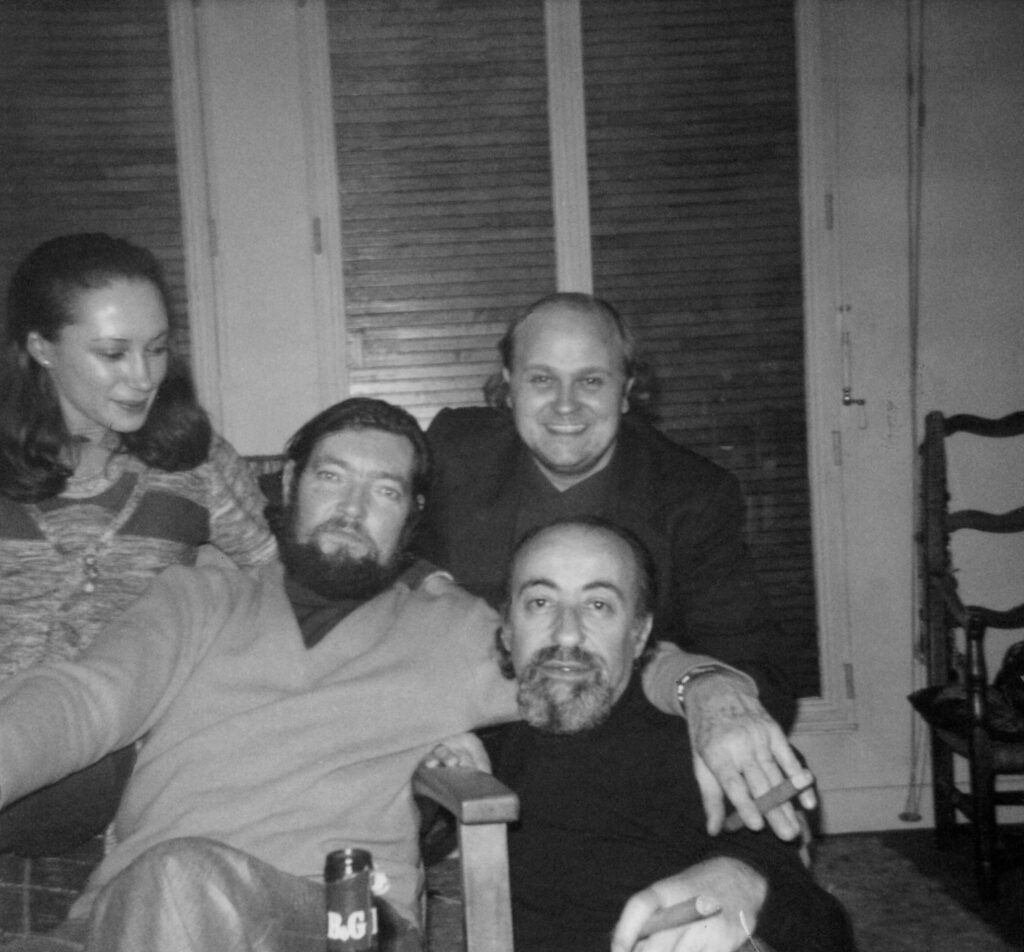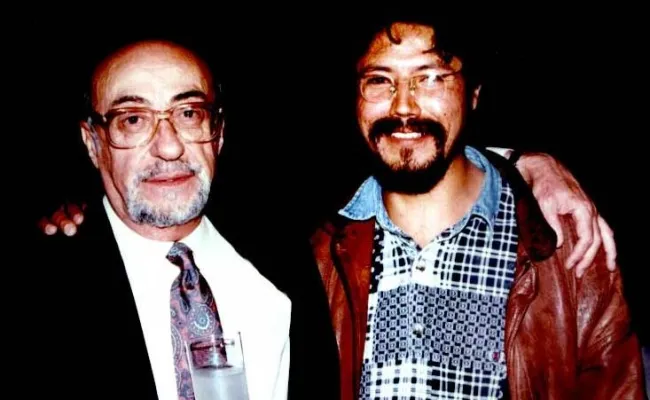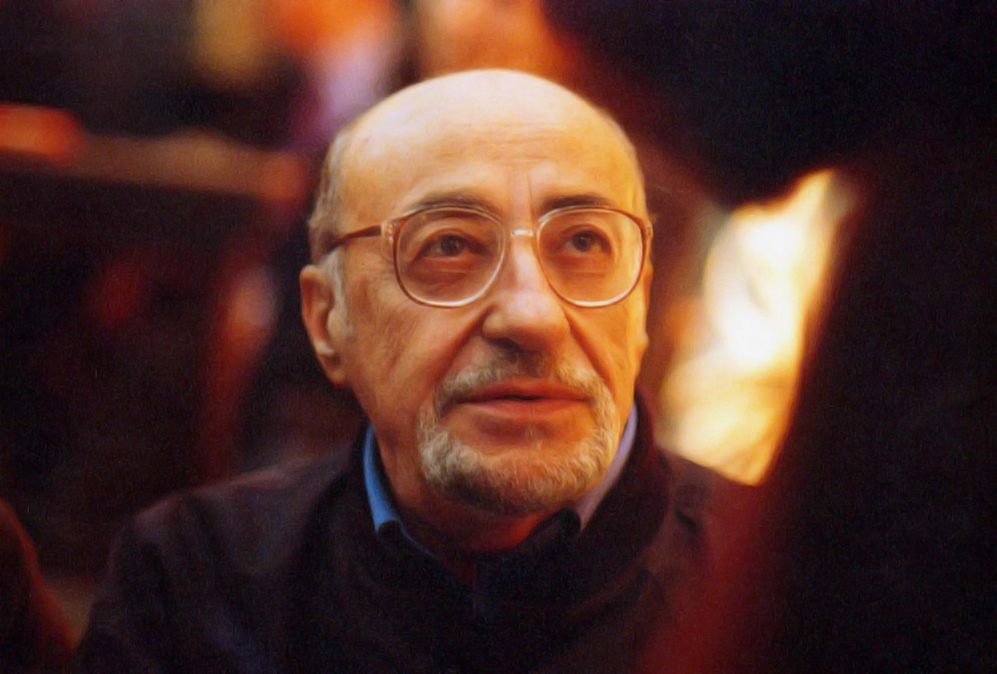Jorge Enrique Adoum, or Jorgenrique Adoum (Ambato, June 29, 1926 – Quito, July 3, 2009) was an Ecuadorian poet, novelist and playwright. Adoum is best known for his poetry collections and his celebrated novel Entre Marx y una mujer desnuda (1976). He is regarded as one of Ecuador’s most important writers and intellectuals of the 20th century. Nobel Prize winner Pablo Neruda hailed Adoum as “the best Latin American poet of his generation.” An English translation of Adoum’s poetry was published by Katherine M. Hedeen and Víctor Rodríguez Núñez under the title “prepoems in postspanish and other poems” (Action Books, 2021). This collection includes three of Adoum’s most groundbreaking books: “Currículum mortis” [Curriculum Mortis] (1973, 1979), “prepoemas en postespañol” [prepoems in postspanish] (1973, 1979), and “El amor desenterrado” [Love Disinterred] (1993). In 1989 the President of Ecuador conferred on Adoum Ecuador’s highest literary prize, the Eugenio Espejo Award, for his lifetime of literary work.
Jorge Enrique Adoum: An Iconic Ecuadorian Writer and Poet
Jorge Enrique Adoum, an Ecuadorian writer, poet, politician, and diplomat, left an indelible mark on Latin American literature. With his powerful literary works, social engagement, and international experiences, Adoum became a prominent figure within the literary landscape of his time.
Early Life and Cultural Background:
Born on June 29, 1926, in Ambato, Ecuador, Jorge Enrique Adoum was of Lebanese descent. His father, Jorge Elías Francisco Adoum (1897-1958), was a multifaceted figure known for his Arabic-to-Spanish translations, art, music, and writings on occult sciences (under the pseudonym “Mago Jefa”) and his mother was Juana Auad Barciona (died 1953). Adoum’s multicultural upbringing and exposure to diverse influences shaped his perspective and fueled his artistic exploration.
Literary Career:
Jorge Enrique Adoum embarked on a prolific literary career, producing an impressive body of work that encompassed nearly 30 books, including poetry collections, novels, essays, and a play. His poetry collections, such as “Ecuador Amargo” (Bitter Ecuador) published in 1949, showcased his keen observations of society and his ability to capture the complexities of human existence. Adoum’s poetic style often intertwined social concerns, personal introspection, and a deep sense of cultural identity.
Among Adoum’s notable works is his novel “Entre Marx y una Mujer Desnuda” (Between Marx and a Naked Woman), which received Mexico’s Xavier Villaurrutia Prize in 1976, making him the first foreigner to receive this prestigious award. The novel masterfully explores the intersection between Marxism and personal liberation, reflecting Adoum’s political and ideological beliefs. It is a testament to his ability to merge social and political themes with engaging storytelling.
Notable Works:
Jorge Enrique Adoum’s literary career encompassed a diverse range of genres, including poetry, novels, essays, and plays. Throughout his prolific output, one of his most notable and celebrated works is the novel “Entre Marx y Una Mujer Desnuda” (Between Marx and a Naked Woman), published in 1976. This groundbreaking novel garnered significant acclaim and left an indelible mark on Latin American literature.
“Entre Marx y Una Mujer Desnuda” explores the intersection of personal and political realms through the character José Gálvez, who is loosely based on the Ecuadorian novelist Joaquín Gallegos Lara. The novel delves into the complexities of identity, ideology, and relationships, weaving together themes of Marxism, personal liberation, and human desires. It presents a nuanced portrayal of the individual’s struggle to reconcile revolutionary ideals with personal experiences and desires.
The novel’s title itself is evocative, capturing the tension between ideology and personal passions. Through its lyrical prose and thought-provoking narrative, Adoum invites readers to contemplate the interplay between political ideology and individual autonomy.
In addition to “Entre Marx y Una Mujer Desnuda,” Adoum’s body of work includes other significant contributions. His poetry collections, such as “Ecuador Amargo,” “Carta para Alejandra,” and “Relato del Extranjero,” showcase his poetic prowess and his exploration of themes related to social injustice, cultural identity, and the human condition. Adoum’s play, “El sol bajo las patas de los caballos” (The Sun Trampled Beneath the Horses’ Hooves), has also garnered recognition and has been translated into multiple languages.
Adoum’s notable works have not only solidified his position as a major figure in Latin American literature but have also contributed to the broader literary canon by addressing essential social and political issues with profound insight and artistic mastery.
International Experiences:
Adoum’s international experiences profoundly influenced his work and worldview. He served as the personal secretary to renowned poet Pablo Neruda in Chile for nearly two years, which provided him with firsthand exposure to the literary world and political activism. In 1963, he embarked on a journey to Egypt, India, Japan, and Israel, sponsored by UNESCO’s Major Project on the Mutual Appreciation of Eastern and Western Cultural Values. However, due to the military dictatorship in Ecuador from 1964 to 1966, Adoum found himself working in the People’s Republic of China, particularly in Beijing. His time in China offered unique perspectives on culture, politics, and social systems, influencing his writing and enriching his understanding of global dynamics.
After his time in China, Jorge Enrique Adoum returned to Paris, where he worked as a journalist and announcer at the Office of Broadcasting and Television of France until 1968. Additionally, Adoum’s time in Paris provided him with the opportunity to connect and interact with other Latin American expatriates, including influential figures such as Julio Cortázar from Argentina. Adoum and Cortázar formed a friendship and were even neighbors during this period. The exchange of ideas and experiences with fellow Latin American writers and intellectuals enriched Adoum’s artistic development and provided a supportive community in a foreign land. From 1969 to 1986, he worked for the United Nations in Geneva and UNESCO in Paris. After nearly 25 years abroad, Adoum finally returned to his home country, Ecuador, in 1987.
Literary Impact and Recognition:
Jorge Enrique Adoum’s literary contributions have left a lasting impact on the Latin American literary scene. His work has been celebrated by notable figures, including the renowned poet and 1971 Nobel Prize winner Pablo Neruda, who in 1952 regarded Adoum as the best poet of his generation in Latin America. Neruda’s praise attests to Adoum’s writing prowess and the respect he garnered within literary circles and from his contemporaries.
Here’s a way to rewrite the sentence using a synonym for “garnered”:
In 1960, Adoum became the first recipient of the prestigious Casa de las Américas Prize for poetry, a recognition that highlighted his profound impact on Latin American literature. His novel “Entre Marx y una Mujer Desnuda” attracted further acclaim when it received the Xavier Villaurrutia Prize. Adoum’s works were celebrated for their introspective depth, social commentary, and linguistic innovation.
Legacy and Cultural Significance:
Jorge Enrique Adoum’s literary legacy extends beyond his written works. He played a significant role in promoting cultural values, challenging colonialism, and advocating for social justice. Adoum’s poems and novels addressed the complexities of cultural identity, the struggle for personal liberation, and the quest for social transformation. His engagement with political ideologies, such as Marxism, showcased his commitment to social change. Adoum’s contributions were widely recognized, and he received numerous prestigious awards throughout his career. Notably, in 1960, he became the first recipient of the Casa de las Américas Prize, which is considered one of Latin America’s most prestigious literary awards. This recognition solidifies Adoum’s position as a literary luminary and underscores his profound impact on the region’s literary landscape. His works continue to resonate with readers, inspiring critical discussions and fostering a deeper understanding of Latin American culture and societal issues.
Personal Life:
In addition to his literary pursuits, Jorge Enrique Adoum’s personal life played a significant role in shaping his experiences and perspectives. In 1948, he married Magdalena Jaramillo Cabezas, with whom he had two daughters. However, their marriage ended in divorce at a later point in Adoum’s life.
In 1977, Adoum entered into a marriage with Nicole Rouan from Gimel, Switzerland. Their paths crossed in Geneva in 1970 when Nicole was an actress in the French version of Adoum’s play “El sol bajo las patas de los caballos” (The Sun Trampled Beneath the Horses’ Hooves). They developed a deep connection, and Nicole became an integral part of Adoum’s life and work. She also contributed to his literary endeavors by translating his works into French. Their marriage lasted until Adoum’s passing. She died on July 13, 2011.
Adoum’s personal relationships extended beyond his marriages. He formed friendships with notable figures in the literary world, including Argentine writer Julio Cortázar. Adoum and Cortázar, who was also an expatriate in Paris, enjoyed a close friendship and shared intellectual exchanges. These connections enriched Adoum’s personal and creative life, allowing him to engage with like-minded individuals who shared his passion for literature and social change.
Books in English Translation:
While Jorge Enrique Adoum’s literary works have garnered recognition and acclaim in the Spanish-speaking world, his books have had limited availability in English translation. However, in recent years, there have been efforts to bring Adoum’s works to a wider English-speaking audience, allowing readers to engage with his poetry.
One notable English translation is the collection of poems titled “prepoems in postspanish and other poems” (2021), translated by Katherine M. Hedeen and Victor Rodriguez Nunez. This selection of poems offers readers a glimpse into Adoum’s poetic universe, exploring themes of love, identity, and the human experience. The masterful translation captures the essence of Adoum’s poetic language, allowing English-speaking readers to appreciate the beauty and depth of his verses.
Jorge Enrique Adoum is primarily recognized for his poetry and novels, but he also wrote a play during his literary career, “El sol bajo las patas de los caballos” (The Sun Trampled Beneath the Horses’ Hooves). This play was translated into multiple languages, including English. The English translation of the play was done by Arthur McMurray and Robert Marquez.
However, it is worth noting that while some of Adoum’s poetry and his play have found its way into English translations, his three novels, including “Between Marx and a Naked Woman,” remain unavailable to English-speaking readers. Their absence in the realm of English translations represents a gap in the accessibility of Adoum’s literary repertoire for a wider international audience.
Partial list of accolades:
- Casa de las Américas Prize (1960): Adoum became the first recipient of this prestigious literary prize for poetry, awarded by Casa de las Américas in Cuba. The prize is considered one of Latin America’s most esteemed literary honors.
- Xavier Villaurrutia Prize (1976): Adoum’s novel “Entre Marx y Una Mujer Desnuda” (Between Marx and a Naked Woman) received this renowned Mexican literary award, making him the first foreign recipient of the prize.
- Premio Eugenio Espejo (1989): Adoum was bestowed with Ecuador’s highest literary honor, the Premio Eugenio Espejo. This prestigious award recognizes a lifetime of literary achievement and contributions to Ecuadorian literature. Presented by the President of Ecuador, the Premio Eugenio Espejo highlights Adoum’s enduring impact and his significant role in shaping the country’s literary landscape.
Political Ideology and Beliefs
From an early age, Jorge Enrique Adoum demonstrated an interest in political ideologies and activism. As a teenager, he attempted to join the Communist Party of Ecuador, driven by his beliefs in communism and social justice. However, he was turned down due to his young age. Despite this, Adoum continued to be a strong advocate for communist ideology throughout his life.
In his most famous book, “Between Marx and a Naked Woman,” the inclusion of the name “Marx” in the title is a direct reference to Karl Marx, the author of “The Communist Manifesto.” This choice signifies Adoum’s ideological alignment with Marxism and his exploration of the intersection between political ideology and personal relationships, symbolized by the juxtaposition of Marx and a naked woman.
Adoum’s commitment to communist ideology influenced his writing and his engagement with social and political issues. His work reflected his belief in the need for societal transformation and equality. Through his poetry and novels, he addressed themes of social injustice, class struggle, and the impact of political ideologies on individuals and society.
The Application of postspanish: From Jorge Enrique to Jorgenrique
Later in life, Jorge Enrique Adoum preferred to publish his books using the version of his name as Jorgenrique Adoum. This change in name not only represented a personal transformation but also aligned with his innovative approach to language and literature. Adoum coined the term “postspanish” to describe his unique writing style, which involved combining words and altering linguistic structures. This experimentation allowed him to challenge traditional boundaries and create new meanings within his texts.
For instance, in his poems, Adoum employed neologisms and rearranged prefixes to disrupt the conventional flow of language. He played with words and prefixes to evoke fresh interpretations, such as “coinciobedience” and “superunderdevelopment.” Through these linguistic inventions, he aimed to dismantle the assumed transparency of language and reveal its potential for subversion and transformation.
Adoum’s innovative use of language extended to his titles as well. His renowned novel “Entre Marx y Una Mujer Desnuda” (Between Marx and a Naked Woman) exemplifies his ability to combine disparate concepts in thought-provoking ways. The juxtaposition of Marx, the influential philosopher of communism, and a naked woman challenges societal norms, highlighting the intersections between political ideology and personal desire.
In this manner, Jorgenrique Adoum’s adoption of the name and his exploration of postspanish exemplify his commitment to linguistic experimentation and his desire to forge a unique path within the realm of literature.
Death and Burial:
Jorge Enrique Adoum passed away at the age of 83 due to heart failure in Quito on July 3, 2009. This marked the end of a prolific literary career and a significant loss for the Ecuadorian literary community. Adoum’s contributions to Latin American poetry and his commitment to artistic expression had made a lasting impact. After his passing, his legacy continued to inspire and resonate with readers around the world.
Adoum’s ashes were laid to rest under “The Tree of Life” next to the ashes of his close friend Oswaldo Guayasamín, a renowned Ecuadorian painter, near Guayasamín’s residence in the hills overlooking Quito. This choice of resting place holds symbolic significance, emphasizing the deep connection and friendship between Adoum and Guayasamín, both influential figures in the cultural and artistic spheres of Ecuador. The location also provides a serene and beautiful setting for Adoum’s final resting place, surrounded by the natural beauty of the landscape.
Pictures


Works
Poetry:
- Ecuador Amargo (1949)
- Carta para Alejandra (1952)
- Los Cuadernos de La Tierra: I. Los Orígenes, II. El Enemigo y la Mañana (1952)
- Notas del Hijo Pródigo (1953)
- Relato del Extranjero (1955)
- Los Cuadernos de la Tierra: III. Dios Trajo la Sombra (1959)
- Los Cuadernos de la Tierra: IV. El Dorado y las Ocupaciones Nocturnas (1961)
- Informe Personal Sobre la Situación (1975)
- No Son Todos Los Están (1979)
- Poesía Viva del Ecuador (1990)
- Disinterred Love (2012) a collection of poems translated into English by Katherine M. Hedeen and Victor Rodriguez Nunez
Novels:
- Entre Marx y Una Mujer Desnuda (1976) – winner of the Xavier Villaurrutia Prize (Mexico, 1976)
- Ciudad sin Ángel (1995) – finalist of the Rómulo Gallegos Prize (Caracas, Venezuela, 1997)
- Los Amores Fugaces (1997)
Essays:
- Ecuador: Señas Particulares (2000)
- De cerca y de memoria (2002)
Theater:
- El sol bajo las patas de los caballos (1970) (English trans., The Sun Trampled Beneath the Horses’ Hooves, 1974, by Arthur McMurray and Robert Marquez)

